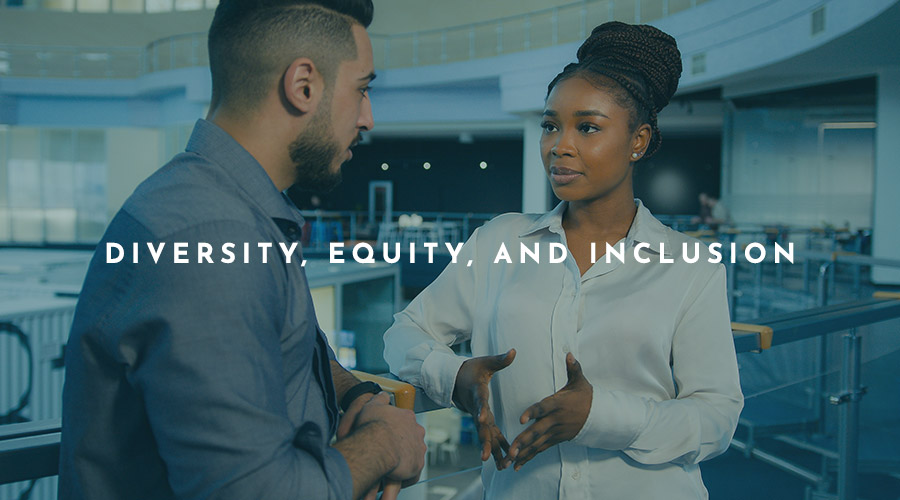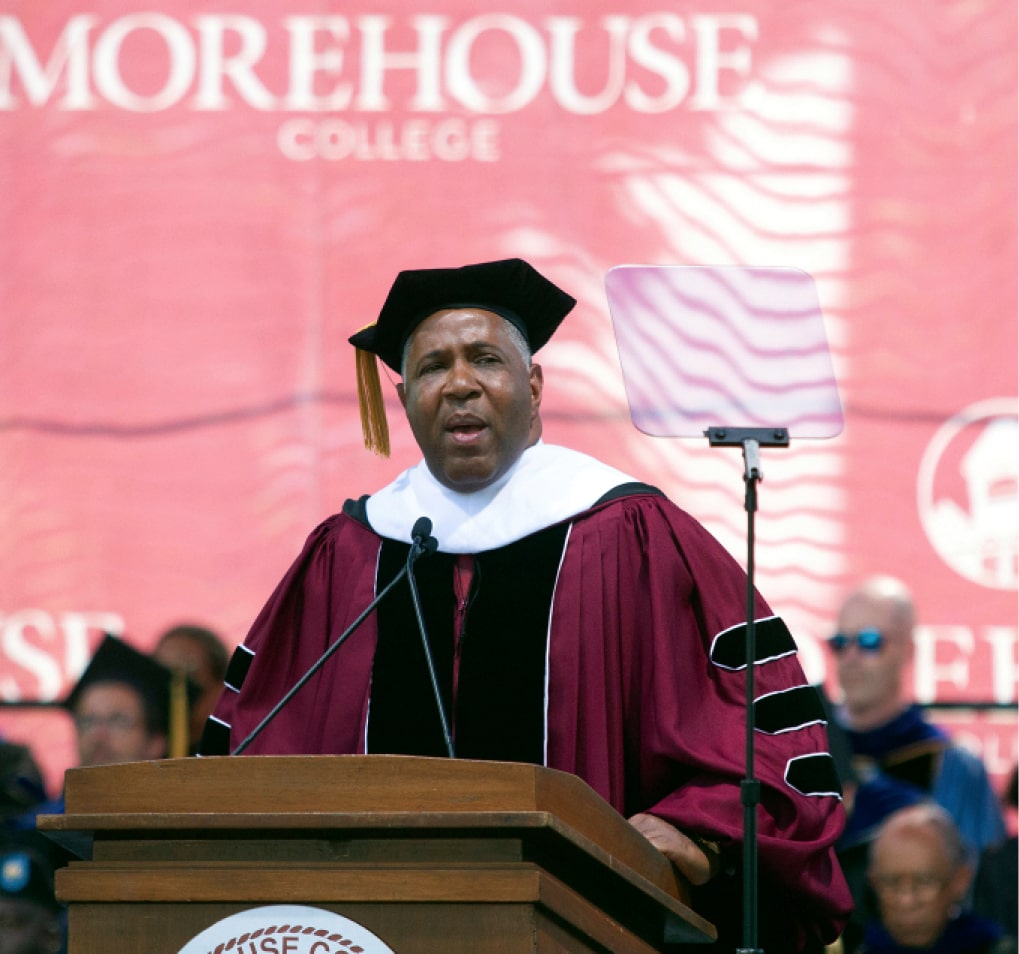Key Takeaways:
- Diversity, equity and inclusion in the workplace include steps that organizations can take to mitigate the barriers that impact the opportunities and growth of their employees.
- It is important to prioritize diversity, equity and inclusion in the workplace, since it aims to empower all employees. Taking steps to create an inclusive workplace can also boost the productivity, innovation and profitability of an organization.
- Organizations can consider a variety of examples of diversity, equity and inclusion in the workplace. Some examples include creating employee resource groups or empowering employees.
The importance of diversity, especially as it pertains to the workplace, is not a new concept. Systemic racism and discrimination have continued to create barriers to work opportunities for professionals of all backgrounds, and organizations have worked to combat it with diversity, equity and inclusion (DEI) examples in the workplace. In recent years, more organizations than ever have made public commitments to become more equitable.
But creating a sustainable DEI environment where all employees feel seen, heard and valued is easier said than done. To successfully weave DEI into the fabric of an organization’s practices and policies, company leaders must understand what it takes to create a DEI-focused environment.
Ahead, we discuss what DEI in the workplace is, why it is important and different examples of DEI in the workplace.
What Is Diversity, Equity and Inclusion in the Workplace?
DEI are principles that guide organizations when making inclusive and equitable decisions. They can help businesses fix the barriers impacting the opportunities and potential success of their employees. Specifically, DEI in the workplace refers to any action, policy or practice an organization implements and uses to create an inclusive environment where all employees feel valued.
DEI is not limited to supporting one group. A comprehensive approach to DEI in the workplace should cater to employees of all races, religions, physical abilities, genders and sexual orientations. To create a workplace culture that champions DEI, organizations must create a multifaceted strategy that is comprehensive, measurable and unique to their needs.
Why Is DEI Important In the Workplace?
First and foremost, making DEI a priority in the workplace is important because it is the ethical thing to do. Everyone deserves to feel safe, heard and valued at work. However, there are also many benefits of implementing DEI in the workplace.
Studies show that employees agree. According to a 2023 Pew Research Center report, more than half of employees in the U.S. think that prioritizing DEI at work is a good use of time and effort.
When employees feel supported, accepted, respected and safe at work, it can help boost the morale of an organization. Ultimately, this can boost an organization’s productivity, innovation and profitability. A 2019 study from McKinsey & Company found that companies with high levels of representation are more likely to outperform their competitors.
Nine Examples of Diversity Equity and Inclusion in the Workplace
When it comes to DEI in the workplace, words are not enough. Companies need to make a thoughtful and genuine commitment to change with actions and policies. Most importantly, organization leaders must understand that DEI is a continuous journey to meaningful change. Explore the nine diversity, equity and inclusion in the workplace examples below to learn about efforts that companies can make.
1. Make Job Descriptions More Transparent and Inclusive
Developing inclusive job descriptions is a great way to foster equity and diversity within a company. It can also help organizations create an inclusive pipeline of talent. While it may be hard to gauge how potential candidates may perceive a job posting, there are some simple steps companies can take. Some of these include:
- Be transparent about the wage range for each position to ensure pay equity.
- Provide different ways for candidates of different abilities to access job postings.
- Use inclusive language to help all candidates feel welcome.
2. Focus on Skills-Based Hiring
When people lack the funds or ability to complete higher education programs, it limits their professional opportunities. To mitigate these barriers, companies should consider skills-based hiring. With this approach, companies focus on desired skills rather than degree requirements. Not only can this provide candidates with economic opportunities, it can also help companies access a wider talent pool and increase diversity.
3. Provide Flexible Perks
Flexible perks are the types of benefits that organizations can offer to ensure that all employees feel seen and heard. Oftentimes, organizations have a set benefit offering that follows traditional norms. However, these rigid offerings can sometimes make employees feel alienated. For example, a company may offer paid time off for one holiday over another. Some perks a company may want to consider include:
- Flexible holidays
- Domestic partner benefit coverage
- Flexible work options
- Parental time off for all new parents
- Access to mental healthcare
4. Use Inclusive Language
Language, whether verbal or written, is an incredibly powerful tool since it can be used to forge strong relationships or make people feel excluded. Organizations looking to become more equitable should promote the use of inclusive language. This type of language is the specific verbiage people use to recognize diversity and show respect to others. Some examples of inclusive language include:
- When referring to a theoretical person, use ‘they’ rather than gendered labels.
- Be thoughtful with verbiage regarding race, culture, medical conditions and abilities.
5. Provide Equitable Access for Every Employee
Creating a workplace with equitable employee access means committing to removing barriers to guarantee that each person has fair opportunities. At its core, this commitment means recognizing situations that require unique accommodations. Some of these accommodations may be based on physical abilities, socioeconomic status or cultural differences. When organizations follow through with these commitments, it creates a work environment where each person can feel comfortable and thrive.
6. Empower Employees
Empowering employees is more than managing tasks — it is a critical process that requires team leaders to create a sense of autonomy, trust and confidence in their direct reports. This process is also an integral part of creating a DEI-friendly work environment. To successfully do this, leaders must provide each team member with the tools, resources and support they need to take initiative and make meaningful contributions. An organization can create a truly inclusive environment by thoughtfully empowering employees, especially those from underrepresented communities.
7. Continuously Evaluate DEI Practices
When it comes to DEI, a one-and-done pledge will not suffice. To be effective, organizations must periodically assess and improve their DEI training and efforts. This includes reviewing and tweaking policies, procedures and initiatives to make sure they align with the organization’s DEI goals and the evolving needs of its employees. When properly reassessing the effectiveness of their efforts, organizations may review metrics, ask for employee feedback or research new DEI best practices.
8. Create Employee Resource Groups (ERGs)
Employee resource groups (ERGs), also known as affinity groups, are voluntary internal communities of employees that strive to create an inclusive workplace. These groups are commonly led and joined by employees who share an interest or characteristic. That may include gender, race, religious beliefs or lifestyle. ERGs are an essential part of an organization since they create a space where employees can seek support, connect and learn. Organizations with ERGs reflect their commitment to creating an inclusive workplace and acknowledge the power of diversity for innovation and collective success.
9. Start Mentorship and Sponsorship Programs
Organizations beginning to create or refresh their DEI strategy should consider implementing a mentorship or sponsorship program. While mentorship and sponsorship both help professionals move forward in their careers, they are different.
Sponsors are typically in a position of power and can create growth and advancement opportunities for less experienced employees. Mentors can be in positions of power, but they can also be the peers of their mentees. These types of role models provide their mentees with the support and guidance they need to gain the confidence to propel their careers forward. Not only are these types of programs helpful in aiding their employees’ advancement, but they also have the potential to improve the representation of underrepresented groups in leadership roles.
To learn more about DEI, including DEI in education, and other critical topics, follow Robert F. Smith on LinkedIn.







